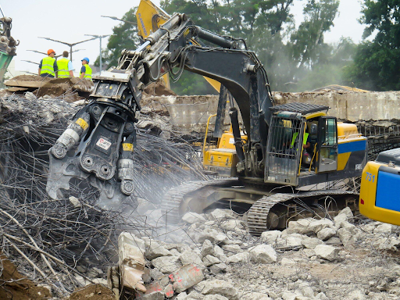
Concrete is essential for construction, but once a project is completed, handling leftover or broken concrete can be a challenge.
Improperly managed, construction waste can harm the environment, raise costs, and clutter your worksite. Knowing how to properly deal with this waste is crucial for sustainability and cost-effectiveness.
In this guide, we'll explore best practices and strategies to help you manage concrete waste efficiently.
What is Concrete Waste?
Concrete waste is any leftover or excess concrete from construction or demolition projects. This can include broken slabs, chunks of old concrete, or unused batches of wet concrete.
Improper concrete disposal can lead to serious environmental issues. These include water pollution and soil contamination. By using smart waste management techniques, you can reduce the negative impact and make your project more eco-friendly.
Best Practices for Managing Concrete Waste
There are several effective strategies for managing concrete waste. By following these best practices, you can help reduce your concrete waste's environmental impact.
Plan for Waste Reduction
The first step in managing construction waste is to reduce the amount of waste produced in the first place. Proper planning can go a long way.
Before starting a project, estimate the amount of concrete you'll need and try to avoid over-ordering. Accurate planning can help reduce excess material that ends up as waste when you're done with the project.
Recycle Leftover Concrete
Recycling is one of the most environmentally friendly methods for handling concrete waste. Instead of sending it to a landfill, leftover concrete can be crushed and reused for future projects.
Recycled concrete can be used as aggregate in new concrete mixes, as road base, or in landscaping projects. This approach helps conserve natural resources and reduce waste.
Donate Usable Concrete
If your concrete is still in good condition but no longer needed, consider donating it. Many community projects or local groups can use leftover concrete for small construction or repair jobs. By donating your concrete waste, you can reduce disposal costs and help others at the same time.
Hire a Concrete Waste Disposal Service
For larger projects, hiring a professional concrete waste disposal service can be a smart move. These services specialize in collecting and disposing of concrete. They do it in an eco-friendly way.
Some companies even offer on-site crushing. It processes and reuses the waste on-site, which cuts transport needs.
Store Concrete Waste Properly
If you need to temporarily store concrete waste, make sure you do it correctly to avoid contamination or safety hazards. Store the waste in designated areas, away from drains.
Cover it to prevent water runoff from carrying particles into local water supplies. Keeping your site organized will also make it easier to transport or recycle the waste water.
Making Concrete Waste Management a Priority
Concrete waste is an inevitable byproduct of construction, but it doesn't have to be a problem. Reduce, recycle, and properly dispose of this waste. It will lower costs, protect the environment, and keep your worksite organized.
Recycling, donating usable concrete, or hiring pros for disposal are options. Managing construction waste responsibly is key to sustainable construction.
Remember, when you're done with your next project, think ahead about how to handle the leftover concrete. It's not just about cleaning up; it's about doing your part for the planet.
Looking for more? We've got plenty in store. Click here to keep the good times rolling!


(0) comments
We welcome your comments
Log In
Post a comment as Guest
Keep it Clean. Please avoid obscene, vulgar, lewd, racist or sexually-oriented language.
PLEASE TURN OFF YOUR CAPS LOCK.
Don't Threaten. Threats of harming another person will not be tolerated.
Be Truthful. Don't knowingly lie about anyone or anything.
Be Nice. No racism, sexism or any sort of -ism that is degrading to another person.
Be Proactive. Use the 'Report' link on each comment to let us know of abusive posts.
Share with Us. We'd love to hear eyewitness accounts, the history behind an article.